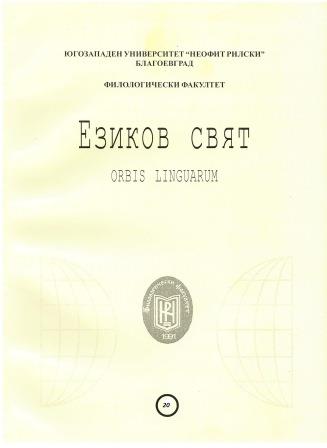ACQUISITION OF MODAL VERBS IN BULGARIAN: ANALYSIS OF LONGITUDINAL DATA FROM CHILDES
ACQUISITION OF MODAL VERBS IN BULGARIAN: ANALYSIS OF LONGITUDINAL DATA FROM CHILDES
Author(s): Velka Popova, Vladimir FilipovSubject(s): Language and Literature Studies, Applied Linguistics, Language acquisition, Cognitive linguistics
Published by: ЮГОЗАПАДЕН УНИВЕРСИТЕТ »НЕОФИТ РИЛСКИ«
Keywords: modality; modal verbs; child speech; child-directed speech; Bulgarian; first language acquisition; CHILDES
Summary/Abstract: The article presents a corpus study of modal verbs in early Bulgarian child speech. The focus is on studying the acquisition of modal verbs following the chronology postulated in the Theoretical Model of the natural morphology of language acquisition while acknowledging the formal- (their presence in a particular phase as a conventional modal means) as well as the functionally-semantic (considering the conventional functions of the modal verbs children use) aspect of the process. The empirical basis of the study includes the longitudinal data of two girls, extracted from the first Bulgarian digital corpus of child speech, available at the CHILDES interactive platform (CHILDES Bulgarian LabLing Corpus – https://childes.talkbank.org/access/Slavic/Bulgarian/LabLing.html). In the course of studying the early stages of the ontogenesis of modal verbs the following developmental lines are clearly distinguished: formal evolution, related to the early emergence and gradual acquisition of the characteristic of the Bulgarian language combinations of modal verb and da-construction; semantic evolution represented by the early establishment of the modal verb може and the gradual accomplishment of the complex semantic complex associated with it, with its 3 meanings – “ability”, “permission” and “possibility”, which reflects the main line in the ontogenesis of modality – dynamic modality → deontic modality → epistemic modality; semantic expansion, involving the acquisition of the modal meaning of the verbs дам/давам / dam/davam(‘give’), which allows them to step outside the reach of their use in donative situations.
Journal: Езиков свят - Orbis Linguarum
- Issue Year: 20/2022
- Issue No: 3
- Page Range: 332-346
- Page Count: 15
- Language: English

